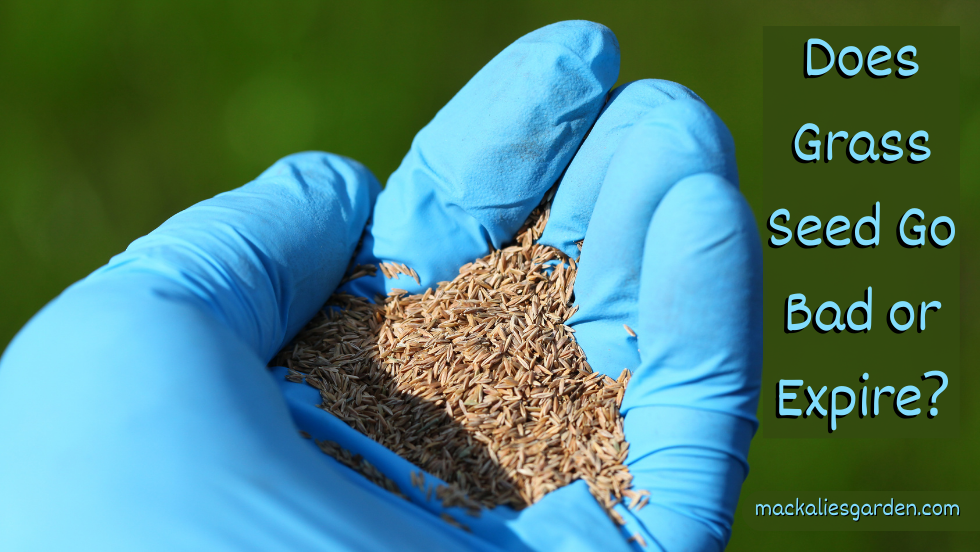As an experienced gardener, I understand that grass seed is essential for a lush and healthy lawn. One common question many people have is: Does grass seed go bad? The answer is both yes and no, as the viability of grass seed is dependent on several factors.
This guide will explore those factors and provide helpful tips on determining if your seeds are suitable for planting, proper storage, and identifying signs of expired grass seed. This guide is designed to be easy to understand for beginners and experienced gardeners alike.
How to Determine If Your Grass Seed Is Still Good?
Determining if your grass seed is still viable for planting can be done using a simple germination test:
- Place 10-20 seeds on a damp paper towel, fold them over to cover them, and place them in a plastic bag, sealing them shut.
- Keep the bag in a warm, dark place for about a week, ensuring the paper towel remains damp.
- After a week, open the bag and check for seed germination. If more than half the seeds have sprouted, they are suitable for planting.
Factors Affecting Grass Seed Viability
The viability of grass seed is influenced by several factors, which include:
- Seed Quality: High-quality seeds, obtained from reputable sources, have a longer shelf life and a better germination rate than low-quality seeds. These seeds are carefully selected, ensuring they are free from impurities and have a higher genetic potential for successful growth.
- Seed Storage Conditions: Proper storage conditions play a vital role in maintaining the viability of grass seed. Seeds stored in cool, dry environments with controlled humidity levels can retain their efficacy for extended periods. On the other hand, seeds stored under inadequate conditions, such as exposure to heat, moisture, or fluctuations in temperature, can lose their viability and germination potential over time.
- Seed Age: Like any other organic material, grass seed ages. As seeds age, their germination rates may decrease, resulting in slower or less successful growth. Using fresher seeds for optimal germination and higher chances of establishing a healthy lawn is recommended.
By considering these factors and ensuring the use of high-quality seeds stored under appropriate conditions, one can maximize grass seed’s viability and germination potential, ultimately leading to a more prosperous and thriving lawn.
Best Way to Store Grass Seed
Proper storage is essential to maintain the viability of grass seed. Here are some storage tips:
- Store your grass seed in a cool, dry place, ideally at temperatures between 40-50°F (4-10°C).
- Keep grass seed away from direct sunlight or extreme heat sources.
- Store grass seed in an airtight container to protect it from excessive humidity and moisture.
- Label the container with the seed type and purchase date to keep track of its age.
Does Grass Seed Go Bad or Expire?
Various factors, including seed quality and storage conditions, influence the grass seed shelf life. When high-quality seeds are stored properly, they can remain viable for 2-3 years, ensuring optimal germination and growth.
In contrast, lower-quality seeds may experience reduced viability after just one year, making them less reliable for successful grass establishment. Therefore, it is crucial to prioritize the quality of the seed and provide suitable storage conditions to maximize its longevity and overall performance.
Best Practices for Guarding Against Reduced Viability
To ensure your grass seed remains viable:
- Purchase high-quality seeds from a reputable supplier or nursery.
- Store seeds in proper conditions as mentioned above.
- Always follow the recommended planting and care instructions provided on the seed packet.
Identifying if Grass Seed Has Gone Bad
Does grass seed expire? Here are some signs to look out for when checking if your grass seed has expired:
- Poor germination rates in the simple germination test.
- A rancid or moldy smell emanates from the seed packet.
- Visible mold or discoloration on the seeds within the packet.
Conclusion
In conclusion, grass seeds can lose their viability over time, but with proper care and storage, it can be maintained for a more extended period. So, can grass seed go bad? The answer is yes, but you can take steps to ensure its longevity and maximize your chances of having a lush and healthy lawn.
This guide gives helpful tips on identifying if your grass seed has gone bad, the best practices for storage, and an easy germination test that you can perform at home. By following these steps, you can be sure that your grass seed is always in optimal condition for successful germination and growth.

Douglas Mackalie is a Founder of Mackalies Garden. He is one of the most exciting people you’ll ever meet. He has 25 years of experience in horticulture and gardening, most of which he’s spent outdoors getting his hands dirty.

